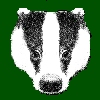 |
www.badgerland.co.uk |
| News about Badgers in the UK |
| Home | Shop | Animals | Pictures | Help | Seeing | Groups | Education | News | Search | Books |
| Badgerland | External | 2010 | 2009 | 2008 | 2007 | 2006 | 2005 | 2004 | 2003 | 2002 | 2001 | 2000 | 1999 | 1998 | 1997 | 1996 |
|
|
|
Cattle movement key to TB spread
26 May 2005 - BBC NewsThe movement of cattle around Britain is the most important known factor in the spread of bovine TB, a study says. Badgers have long been blamed for the spread of TB in UK herds and the government has threatened a cull if further studies back this up. Conservationists said the evidence for this link was slight and have seized on the new analysis, published in Nature. An association with badgers is found in the study - but not a prominent one - according to the UK-Belgian team. At least one of the factors is that animals get moved around a lot more today William Wint, Environmental Research Group "Movement is more important in spreading TB than anything else from the national point of view," co-author William Wint, of the Environmental Research Group in Oxford, told the BBC News website. "Our study certainly doesn't let badgers off the hook, but then it doesn't hang them up on a cross either." Three thousand, three hundred British farms are thought to be infected with bovine tuberculosis, with the figure rising at 18% each year. The researchers analysed millions of records from the British Cattle Movement Service, using a statistical technique known as multiple logistic regression. They found that cattle movement from infected areas to clean farms was by far the best predictor of bovine TB distribution on a national level. "We now need to work out what is different to the 1970s and 1980s when it wasn't spreading so much. At least one of the factors is that animals get moved around a lot more today. It's what tripped them up during the foot-and-mouth situation," said Dr Wint. Possible options for tackling the problem include restrictions on movement generally - which would be unpopular amongst farmers - or to bring in pre-movement testing for TB in herds. A spokesperson for the Department for Environment, Food and Rural Affairs (Defra) said they were looking at introducing a statutory requirement for pre-movement testing in cattle. "There are a number of factors we need to look at. The information we're getting from reports like this and those into badgers are feeding into our policy decisions," a spokesperson said. Dr Elaine King, chief executive of the National Federation of Badger Groups, said the government now needed to "get a grip" on cattle movements. "After 30 years of blaming badgers for spreading [bovine TB], farmers and vets have to face up to the reality that farming itself is to blame for the massive escalation in the disease," she said. However, supporters of badger culls point to the so-called Four Counties Trial carried out in Ireland. The study compared the detection rate of bovine TB in a "reference area" where few badgers were culled with those in a "removal area" where badgers were culled proactively. By the end of the study, the chances of a bovine TB case in a herd from the removal area had fallen dramatically compared with the reference area - the strongest evidence yet of a link between badgers and TB in cattle. But Dr Wint stressed that the Nature study said "nothing about the need for future badger interventions". "Nor does it affect the conclusions of previous work on the involvement of badgers in TB transmission to cattle," he added. For more information, please click the following link:
|
|||||||||||||||||||||||||||||||||||